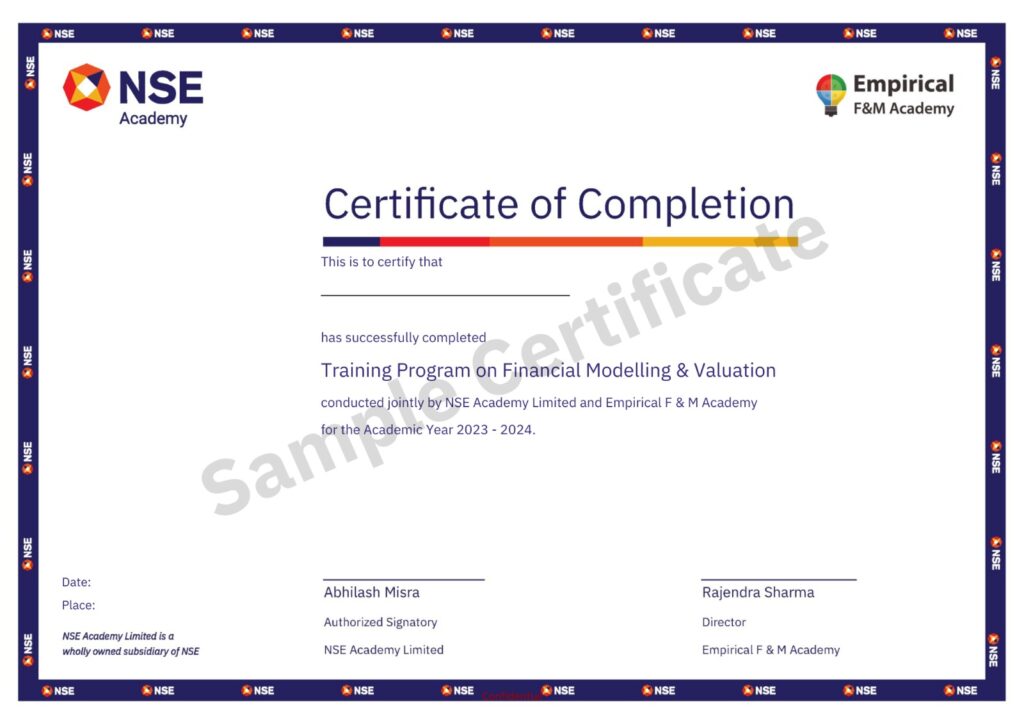
FINANCIAL MODELLING & VALUATION
Financial modeling refers to the process of creating financial models to estimate the valuation of an asset or firm
Overview
Financial Modelling and Valuation are two important skills for financial analysts, investors, and business owners.Financial models can also be used for a variety of purposes such as cost estimation, projection of profits, forecasting future earnings, allocating resources, making budgeting decisions, etc. Financial Valuation is the process of determining the fair market value of an asset or firm based on its expected future cash flows, risk, and growth potential. Financial Valuation can help investors to assess the attractiveness of an investment opportunity, compare different investment alternatives, and negotiate deals, and exit strategies. Financial Modeling and Valuation require a solid understanding of accounting, finance, economics, and business principles. They also require proficiency in Excel and other software tools that can help create and analyze financial models. We cover each component of the statement financial model from creating detailed forecast assumptions to modeling out each of the financial statements (P&L, Cash Flow Statement, Balance Sheet) within Excel. We use a highly practical learning approach with a student-led case study completed during the course.
Key Features
Industry-Recognized Certification
The certification will enhance your profile and make you a top choice among employers. Earn a certificate of completion from NSE Academy & Empirical Academy.
Valuation of the Company
Understanding the company valuation and financial analysis
Acquire knowledge in the corporate world
Acquire skills to do comprehensive research on the performance of companies
Financial Industry Professionals
Professionals within the industry prioritizing curriculum and training specific to financial institutions.
Flexible Learning and Support
Learn at your own pace, move between multiple courses, or switch to a different course and access the courses through Mobile, Desktop & Laptop
Live & Interactive Digital Learning
Learn from anywhere at your comfort & experience the real time communication that will help you clear your doubts & query
Faculty
Highly Qualified faculty (Including CA,CFA,FRM,MBA and PhD holders) having experience of working in the Corporate World. So that they can give a better understanding of financial concepts with real-world implications. Along with giving real-life examples the faculty will also support you in solving the real-life scenario and help the learners innovate in business practice.
Empirical Academy faculty team includes outstanding educators and researchers from both the academic and business sectors, contributing towards the overall professional and personal growth of the students. Interactions with prominent leaders/senior executives from the industry, allowing you to benefit from the experience gained in leading positions around the globe. Empirical Academy Faculty are highly qualified and experienced faculty are the greatest asset of the Organisation.

Will you get Certified?
When you complete our Certified Financial Modelling and Valuation Course, you will earn a Professional Certificate that will add considerable value and help your career evolve in the right direction.
Earn Your Certificate
Share your Achievement
Audience:
Students | Investors/Clients | Traders | Sub-Brokers/Dealers | Working Executives | Other Financial Intermediaries | Any person who is interested in the Financial Modelling and Valuation

Course Curriculum
- Introduction
- What is Financial Modelling and Valuation
- Sources of Financial Information
- Income Statement, Cash Flow Statements & Balance Sheet
- Understanding Business Drivers
- Understanding Working Capital Drivers
- Case Study
- Understanding Revenue Drivers & Balance Sheet Drivers
- Steps of Financial Statement Analysis
- – Financial Ratio
- – Activity Ratio
- – Liquidity Ratio
- – Solvency Ratio
- – Cash Flow Ratio
- DCF Valuation
- Weighted Average Cost of Capital
- Sensitivity Analysis
- Relative Valuation
- Case Study [2 Industry cases with Template]
